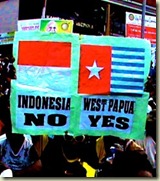
The irony is that whilst European leaders are backslapping the Indonesian government and congratulating them upon environmental advances, that same government is continuing to orchestrate the violent and barbaric oppression of minority groups, violating principles of human rights and democracy that are supposedly at the heart of the EU.
Whilst twelve men accused of participating in the brutal murder of Ahmadyyia Muslims in February have now been brought to trial, the government-fostered culture of religious intolerance and flagrant state persecution of Ahmadis that inspired the killings in the first place, continues unabated. President Yudhonoyo, whilst ludicrously insisting that there is no problem with extremism in Indonesia, continues to pander to the extremist bigots and has been ominously uncritical, if not tacitly supportive of recent official calls to ban Ahmadyyia altogether. EU appeals for the Yudhonoyo administration to respect religious freedom have clearly fallen on deaf ears, somewhat hollowing out the triumphant air of partnership and understanding that has surrounded the timber deal.
of Ahmadyyia Muslims in February have now been brought to trial, the government-fostered culture of religious intolerance and flagrant state persecution of Ahmadis that inspired the killings in the first place, continues unabated. President Yudhonoyo, whilst ludicrously insisting that there is no problem with extremism in Indonesia, continues to pander to the extremist bigots and has been ominously uncritical, if not tacitly supportive of recent official calls to ban Ahmadyyia altogether. EU appeals for the Yudhonoyo administration to respect religious freedom have clearly fallen on deaf ears, somewhat hollowing out the triumphant air of partnership and understanding that has surrounded the timber deal.
 Even more paradoxical is the relative EU silence on the Indonesian occupation of West Papua, especially in light of recent demonstrations calling for a genuine independence referendum. Whilst the EU has been openly critical of some of the worst abuses committed by Indonesia's troops, the body has yet to produce any tangible support for the Papuan people. Clearly those congratulating themselves for effectively ending illegal timber sales to the EU have overlooked the devastating government-led deforestation of West Papua, carried out against the express will of the indigenous population and wholly unaffected by this week’s agreement.
Even more paradoxical is the relative EU silence on the Indonesian occupation of West Papua, especially in light of recent demonstrations calling for a genuine independence referendum. Whilst the EU has been openly critical of some of the worst abuses committed by Indonesia's troops, the body has yet to produce any tangible support for the Papuan people. Clearly those congratulating themselves for effectively ending illegal timber sales to the EU have overlooked the devastating government-led deforestation of West Papua, carried out against the express will of the indigenous population and wholly unaffected by this week’s agreement.
We are consequently presented with the bizarre situation in which European representatives - quite rightly - secure a degree of protection for Indonesian flora and fauna, yet simultaneously offer little more than lip service when it comes to the rights those living under Yudhoyono’s rule or even the vast areas of tropical forest that his own government sees fit to destroy. This week’s deal should be congratulated but economic and ecological discussions should always be used as opportunities to raise human rights concerns. Furthermore, the fundamental inter-relation between issues such as indigenous Papuan rights and conservation should also be put forward, offering a broader joined-up approach rather than simply targeting narrow matters in isolation. Above all, as more deals are concluded with Indonesia and relationships continue to grow, the EU should never let congratulatory rhetoric cloud the fact that Yudhoyono’s regime is abusive, racist - and must be held to account



No comments:
Post a Comment